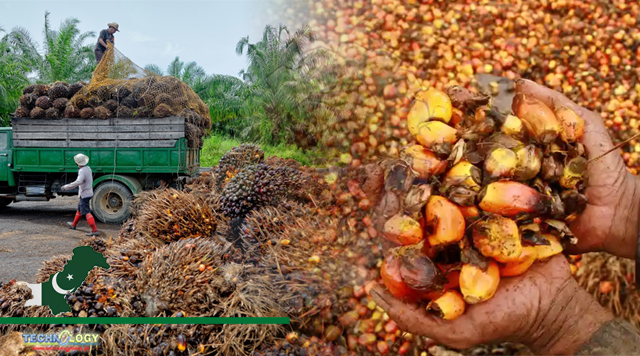“Palm oil accounts for a hefty part of imported edible oil, which is of low quality and causes health problems” this was stated by Dr Muhammad Zafar Iqbal, the Chief Scientist ,Agricultural (Research), Ayub Agricultural Research Institute (AARI), Faisalabad on the eve of launching ceremony of newly published Book-cum-Report by Oilseeds Research Institute(ORI), Faisalabad.
By Dr. Muhammad Ijaz Tabassum

“Palm oil accounts for a hefty part of imported edible oil, which is of low quality and causes health problems” this was stated by Dr Muhammad Zafar Iqbal, the Chief Scientist ,Agricultural (Research), Ayub Agricultural Research Institute (AARI), Faisalabad on the eve of launching ceremony of newly published Book-cum-Report by Oilseeds Research Institute(ORI), Faisalabad.
By addressing the scientists community, Dr Zafar further stated that the current circumstances of COVID-19 has also driven-up international price for edible oil and oilseeds. He concluded that it is necessary to cogitate on increasing local oilseeds production.
Earlier, Mr Muhammad Aftab, the chief scientist, ORI, Faisalabad revealed the significance of local oilseeds production and local production of edible oil is still less than 15% of country’s requirements.
Therefore, the gap between production and consumption of edible oil is tranquil increasing due to increase in population alongwith increase in per capita consumption of edible oil in our daily diet.
Mr Aftab further highlighted the salient achievements /activities being run in the Institute that we have developed uptill now, more than 30 varieties/hybrids of Canola, Mustard, Sunflower, Sesame and Soybean that contributed significant role in enhancing provincial and national production of oilseeds. He added that Canola variety named “AARI-Canola” is the Pakistan 1st Canola version (00) variety in Mustard group and got much popularity among farmers due to short growing period, shattering tolerance and high Omega-3 oil.
On the launching ceremony of the 2nd edition of ‘Prospects of Oilseed Crops in Pakistan, the National Coordinator (Oilseeds), Pakistan Agricultural Research Council, Islamabad indicated that the importance of domestic edible oil and stressed that there is a large scope for vertical expansion in oilseed production with proper crop management practices.
However, in the session, it was discussed in detail by the scientists that edible oil is an integral part of human diet and contributes vital role for proper development and regulation of different body functions when consumed in proper ratio whereas, edible fats and oils are mainly composed of triacylglycerols (TAG), accompanied by lower levels of diacylglycerols (DAG), monoacylglycerols (MAG) and free fatty acids (FFA). Minor components include phosphatides, sterols, fatty alcohols, fat soluble vitamins and other compounds.
The compositional data of both macro and micro components of vegetable oils may significantly differ depending on the cultivar, geographical location, and climate, maturity stage of the fruit, oil extraction and refining process.
Vegetable oils is considered to be better for human health due to zero cholesterol and higher percentage of mono and poly unsaturated fats than butter/ghee obtained from animal source.
The body can synthesize most of the fats it needs from the diet. However, two essential fatty acids, Omega-6 (Linoleic acid) and Omega-3 (alpha-linolenic acid), cannot be synthesized in the body and must be obtained from food.
Omega-3 and Omega-6 fatty acids are important in the normal functioning of all tissues of the body. Fish oil and walnut oil have been popularized as an Omega-3 supplemental option. However, the omega-3 found in fish oil are highly unstable molecules that tends to decompose and unleash dangerous free radicals, making these supplements an unfavorable option for cardiovascular health.
Obtaining omega-3 from plant sources is more beneficial for health. So, omega-3 found in Canola, Camelina, Sesame, Soybean and linseed are more stable.
Omega-9 (Oleic acid) is another important fatty acid found in edible oil, which controls cholesterol level to maintain normal blood pressure, increase fat burning to help in weight loss, protect cells from free radical damage, may prevent type II diabetes, prevent ulcerative colitis and generate brain myelin. The appropriate quantity of omega-9 in any edible oil enhances its stability during cooking.
Deficiencies in these fatty acids lead to a host of symptoms and disorders including abnormalities in the liver and the kidneys, reduced growth rates, decreased immune function, depression, and dryness of the skin. Adequate intake of the essential fatty acids results in numerous health benefits.
Documented benefits include prevention of atherosclerosis, reduced incidence of heart disease and stroke, and relief from the symptoms associated with ulcerative colitis, menstrual pain and join pain.
Omega-3 fatty acids levels have also been associated with decreased breast cancer risk. It is not only important to incorporate good sources of omega-3, omega-6 and omega-9 in daily diet, but also consume these fatty acids in the proper ratio.
Last but no means the least, Canola, Sunflower, and Sesame crops are the potential oilseed crops to overcome the current edible oil situation in the country. So, as a future strategy, the surplus area of wheat and sugarcane can be brought under Canola and Sunflower cultivation.
There exists possibility of enhancing oilseeds production upto 34.41% of the domestic needs using additional area from wheat and sugarcane. On the other hands, Olive, Oil-palm, Coconut, Soybean, Camelina and Sunflower cultivation should be promoted with complete package of production technology in potential areas as alternative options to achieve self-sufficiency in edible oil.
For this, joint efforts of all oilseeds stakeholders will make it possible through motivation of farmers, provision of quality seed, and dissemination of appropriate production technology, provision of machinery on subsidized rates and the assurance of procurement with reasonable price to achieve destination of self-sufficiency.
The writers of this book-cum-report are Muhammad Aftab (Chief Scientist), Tariq Mahmood (Principle Scientist) and Hafiz Saad Bin Mustafa (Scientific Officer) of Oilseeds Research Institute, Faisalabad.